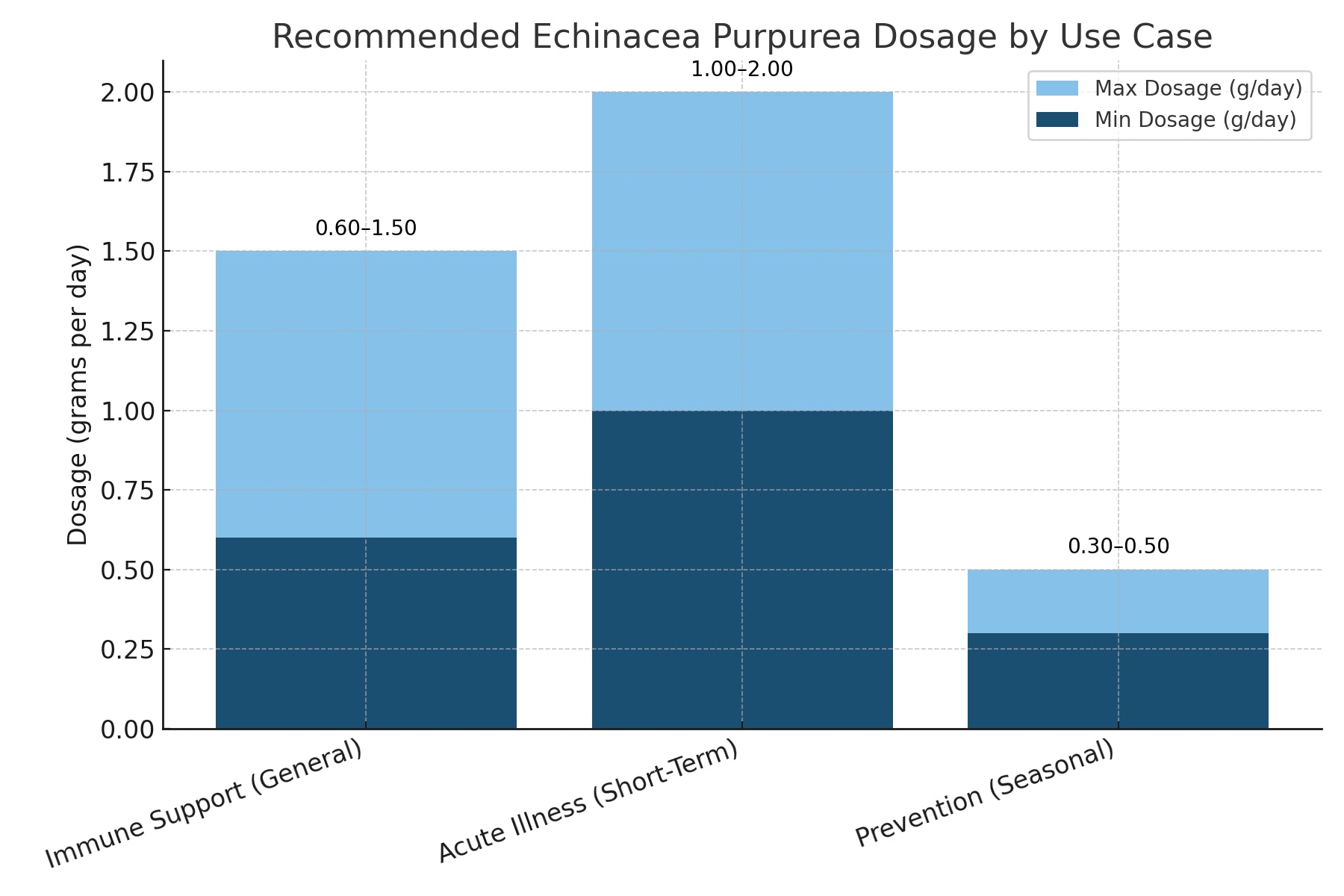
Echinacea Purpurea, known as purple coneflower, is a flowering plant native to North America. With its bright purple petals and spiky central cone, it's a powerful herb with deep roots in traditional medicine. Indigenous American tribes were the first to harness the healing properties of Echinacea, using it to treat infections, wounds, and general illnesses.
Today, Echinacea is one of the most widely researched herbal remedies, especially for its immune-modulating effects. [1] The plant belongs to the daisy family, and while there are several Echinacea species, Echinacea Purpurea is considered the most potent and effective when it comes to immune support.
There are three main species of Echinacea used in supplements: Echinacea Purpurea, Echinacea Angustifolia. Echinacea Pallida. [2]
Among them, Echinacea Purpurea is the most potent as it contains high levels of phenolic compounds, flavonoids, and alkamides, all of which contribute to its immunostimulant and anti-inflammatory properties. [1] Purpurea is also easier to cultivate and more sustainable, making it a preferred option for large-scale, quality supplement production.
Echinacea Purpurea Extract is made by harvesting the aerial parts (flowers, stems, leaves) and sometimes the roots of the plant, then subjecting them to an ethanol or water-based extraction process. This concentrates the active compounds, including: [3]
Miduty Echinacea Purpurea Extract is present in Miduty Ultimate Defence unlike many supplements that offer Echinacea as a standalone ingredient, Miduty's Ultimate Defence combines it with other potent immune-supporting components such as Vitamin C, Amla Extract, Elderberry Extract, Wheatgrass, Kiwi Extract, Zinc Gluconate, and Citrus Bioflavonoids.
Miduty prioritizes organic, non-GMO Echinacea Purpurea, cultivated without synthetic pesticides or fertilizers. Many lower-end supplements use conventionally farmed, chemically treated ingredients, reducing their natural therapeutic value.
Choosing Miduty means you're supporting your body with a pure, clean, and powerful plant extract, backed by nature and science. Miduty offers this supplement in an effervescent tablet form, which ensures rapid absorption and bioavailability of nutrients. This format is not only convenient but also enhances the body's ability to utilize the active ingredients effectively.
| Uses & Benefits | Description |
| Immune System Stimulation |
Echinacea Purpurea is best known for its ability to stimulate the immune system. It activates key immune cells such as macrophages, natural killer (NK) cells, and lymphocytes. [4] This makes it ideal for boosting the body's natural defense mechanisms against pathogens. It’s often taken during the onset of illness or even preemptively during the cold and flu season to help the body prepare for microbial invaders. |
| Cold and Flu Prevention |
One of the most popular uses for Echinacea extract is in the prevention and management of colds and the flu. Studies have shown that taking Echinacea can reduce both the frequency and duration of respiratory infections. It works by interfering with the virus’s ability to enter and replicate in the body’s cells, while also reducing inflammation and congestion. [5] Echinacea Purpurea can cut down the duration of symptoms by up to 1–3 days, according to several clinical studies. Users often report faster recovery from sore throat, nasal congestion, fatigue, and even mild fever. This effect is strongest when the extract is taken within 24 hours of symptom onset and used consistently for a few days. |
| Wound Healing and Skin Health |
Beyond its immune-boosting potential, Echinacea Purpurea has also been used topically for its skin-healing properties. The extract helps stimulate fibroblast activity and collagen production, making it useful for: [6]
|
| Anti-inflammatory and Antioxidant Applications |
Echinacea is rich in antioxidants like rosmarinic acid and caffeic acid, which help protect the body from oxidative stress. [2] It also has a notable impact on reducing systemic inflammation by inhibiting pro-inflammatory cytokines. This makes it helpful for people dealing with chronic inflammation, joint pain, or fatigue-related conditions—though it’s most commonly known for acute immune use. |
| Supports Respiratory Function |
Having anti-inflammatory and mild expectorant properties, Echinacea can help alleviate respiratory symptoms. It works by reducing the swelling of mucous membranes, clearing up congestion, and easing coughing. [7] This is particularly beneficial for individuals who are prone to bronchitis, sinus infections, or asthma flare-ups during cold weather. |
| Promotes Cellular Health |
The antioxidants and anti-inflammatory compounds in Echinacea Purpurea protect your body at a cellular level. They help neutralize free radicals, reduce cellular oxidative stress, prevent premature aging of cells, support mitochondrial function and energy production. [8] In this way, Echinacea isn’t just a seasonal immune herb it supports overall wellness and vitality year-round. |

The ideal dosage varies depending on the product's concentration, but for a standardized Echinacea Purpurea Extract, the common range is:
It's worth noting that Echinacea is not typically recommended for long-term daily use beyond 8-10 weeks at a time, unless advised by a healthcare provider.
When using Echinacea Purpurea Extract to strengthen your immune system and prevent illness, the best time to take it is in the morning, ideally with your first meal. This allows your body to begin the day with heightened immune function and protection.
During times when you're more vulnerable to infections such as during flu season, when traveling, or after being exposed to someone who's ill, taking Echinacea consistently once or twice a day can provide an effective defense.
It's also commonly used a week before expected exposure (like before a trip or a public event) to prepare your body for immune challenges ahead.
If you're taking Echinacea at the first sign of cold or flu symptoms, timing becomes more frequent and critical:
Echinacea is generally safe for short-term use but not recommended for long-term daily use without breaks. For example:
Breaks recommended: After 6-8 weeks of use, take a 1-2 week break.
Echinacea Purpurea is generally well-tolerated by most users, especially when used in recommended doses and for short periods. However, some individuals may experience mild side effects such as: Nausea or stomach upset, Dry mouth or throat, Mild dizziness or drowsiness
More rarely, allergic reactions may occur especially in individuals allergic to plants in the daisy family (like ragweed, marigolds, or chrysanthemums). Signs include rash, itching, or swelling, and in rare cases, anaphylaxis. Discontinue use immediately and seek medical attention if any serious symptoms occur.
Echinacea can interact with certain medications, particularly those that affect the immune system or liver enzymes. Use caution if you are taking: Immunosuppressants (like for autoimmune conditions or organ transplants), Corticosteroids, Hepatotoxic drugs (drugs metabolized by the liver)
Because Echinacea stimulates the immune system, individuals with autoimmune disorders (like lupus, MS, or rheumatoid arthritis) should consult a doctor before use. Pregnant or breastfeeding women should also avoid Echinacea unless advised by a healthcare provider due to limited safety data.
Echinacea Purpurea Extract is a versatile and powerful herb that’s ideal for:
It's also suitable for short-term use by those looking for an edge in staying healthy during high-risk periods like flu season, cold weather, or periods of high stress. Echinacea is most effective when paired with a balanced lifestyle adequate sleep, stress management, proper nutrition, and exercise. While it's not a miracle cure, it provides reliable and science-supported immune reinforcement that helps your body perform at its best.
Echinacea purpurea extract is widely used to strengthen the immune system and help the body fight infections like colds, flu, and respiratory issues. It also has anti-inflammatory, antioxidant, and antimicrobial properties, making it useful for wound healing, reducing inflammation, and supporting overall wellness. Some people also take it to ease symptoms of sore throat, cough, and seasonal allergies.
Yes, echinacea is considered beneficial for skin health. Its antioxidant and anti-inflammatory properties help protect against free radical damage, reduce redness, and soothe irritation. It may also support wound healing and improve skin hydration, making it useful in natural skincare.
Echinacea purpurea is generally safe for short-term use, but some people may experience side effects. Common ones include nausea, stomach upset, dizziness, or headaches. It may also cause allergic reactions, especially in individuals allergic to plants like ragweed, daisies, or marigolds. In rare cases, it can trigger skin rashes or worsen asthma. Long-term or excessive use may affect liver function or interact with certain medications.
Echinacea may not be suitable for everyone. People with autoimmune conditions, severe allergies (especially to the daisy family), asthma, or liver problems should avoid it. It's also not recommended for young children, pregnant or breastfeeding women, and those taking immunosuppressants or liver-affecting medicines. Always consult a healthcare professional before use.
Echinacea can be taken daily, but it's generally recommended for short-term use, especially during cold and flu season, rather than continuous long-term use. Prolonged daily intake may reduce its effectiveness and could increase the risk of side effects. Most experts suggest using it for a few weeks at a time, then taking a break. It's best to follow dosage guidelines and consult a healthcare professional before starting daily use.
